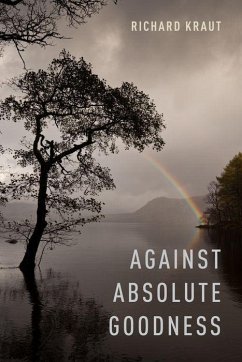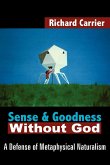Richard Kraut
Against Absolute Goodness
Richard Kraut
Against Absolute Goodness
- Gebundenes Buch
- Merkliste
- Auf die Merkliste
- Bewerten Bewerten
- Teilen
- Produkt teilen
- Produkterinnerung
- Produkterinnerung
Are there things we should value because they are, quite simply, good? Richard Kraut argues that there are not. Goodness, he holds, is not a reason-giving property - in fact, there may be no such thing. It is an illusory and insidious category of practical thought.
Andere Kunden interessierten sich auch für
![On Goodness On Goodness]() David Conan WolfsdorfOn Goodness120,99 €
David Conan WolfsdorfOn Goodness120,99 €![The Nature of Goodness The Nature of Goodness]() George Herbert PalmerThe Nature of Goodness35,99 €
George Herbert PalmerThe Nature of Goodness35,99 €![On the Power, Wisdom, and Goodness of God, as Manifested in the Adaptation of External Nature, to Th On the Power, Wisdom, and Goodness of God, as Manifested in the Adaptation of External Nature, to Th]() Thomas ChalmersOn the Power, Wisdom, and Goodness of God, as Manifested in the Adaptation of External Nature, to Th33,99 €
Thomas ChalmersOn the Power, Wisdom, and Goodness of God, as Manifested in the Adaptation of External Nature, to Th33,99 €![On the Power, Wisdom, and Goodness of God On the Power, Wisdom, and Goodness of God]() Thomas ChalmersOn the Power, Wisdom, and Goodness of God38,99 €
Thomas ChalmersOn the Power, Wisdom, and Goodness of God38,99 €![Sense and Goodness Without God Sense and Goodness Without God]() Richard CarrierSense and Goodness Without God27,99 €
Richard CarrierSense and Goodness Without God27,99 €![The Bridgewater Treatises On the Power, Wisdom and Goodness of God As Manifested in the Creation, Volume 5, Part 1 The Bridgewater Treatises On the Power, Wisdom and Goodness of God As Manifested in the Creation, Volume 5, Part 1]() Francis Henry Egerton BridgewaterThe Bridgewater Treatises On the Power, Wisdom and Goodness of God As Manifested in the Creation, Volume 5, Part 132,99 €
Francis Henry Egerton BridgewaterThe Bridgewater Treatises On the Power, Wisdom and Goodness of God As Manifested in the Creation, Volume 5, Part 132,99 €![The Bridgewater Treatises On the Power, Wisdom and Goodness of God, As Manifested in the Creation. Treatise I-Ix.: On the Power, Wisdom and Goodness o The Bridgewater Treatises On the Power, Wisdom and Goodness of God, As Manifested in the Creation. Treatise I-Ix.: On the Power, Wisdom and Goodness o]() AnonymousThe Bridgewater Treatises On the Power, Wisdom and Goodness of God, As Manifested in the Creation. Treatise I-Ix.: On the Power, Wisdom and Goodness o41,99 €
AnonymousThe Bridgewater Treatises On the Power, Wisdom and Goodness of God, As Manifested in the Creation. Treatise I-Ix.: On the Power, Wisdom and Goodness o41,99 €-
-
-
Are there things we should value because they are, quite simply, good? Richard Kraut argues that there are not. Goodness, he holds, is not a reason-giving property - in fact, there may be no such thing. It is an illusory and insidious category of practical thought.
Produktdetails
- Produktdetails
- Verlag: Oxford University Press
- Seitenzahl: 240
- Erscheinungstermin: 2. Dezember 2011
- Englisch
- Abmessung: 213mm x 147mm x 28mm
- Gewicht: 363g
- ISBN-13: 9780199844463
- ISBN-10: 0199844461
- Artikelnr.: 37254148
- Herstellerkennzeichnung
- Libri GmbH
- Europaallee 1
- 36244 Bad Hersfeld
- gpsr@libri.de
- Verlag: Oxford University Press
- Seitenzahl: 240
- Erscheinungstermin: 2. Dezember 2011
- Englisch
- Abmessung: 213mm x 147mm x 28mm
- Gewicht: 363g
- ISBN-13: 9780199844463
- ISBN-10: 0199844461
- Artikelnr.: 37254148
- Herstellerkennzeichnung
- Libri GmbH
- Europaallee 1
- 36244 Bad Hersfeld
- gpsr@libri.de
Richard Kraut was educated at the University of Michigan and Princeton University. He has taught in the Philosophy Departments at the University of Illinois at Chicago, and Northwestern University, where he is Charles E. and Emma H. Morrison Professor in the Humanities.
Contents
Acknowledgments
1. Moore and the Idea of Goodness
2. Goodness Before and After Moore
3. An Argument for Absolute Goodness
4. Absolute Evil, Relative Goodness
5. Recent Skepticism about Goodness
6. Being Good and Being Good for Someone
7. Non-Instrumental Advantageousness
8. The Problem of Intelligibility
9. The Problem of Double Value
10. Pleasure Reconsidered
11. Scanlon's Buck-Passing Account of Value
12. Moore's Argument Against Relative Goodness
13. Goodness and Variability
14. Impersonality: an Ethical Objection to Absolute Goodness
15. Further Reflections on the Ethical Objection
16. Moore's Mistake About Unobserved Beauty
17. Better States of Affairs and Buck-Passing
18. The Enjoyment of Beauty
19. Is Love Absolutely Good?
20. Is Cruelty Absolutely Bad?
21. Kant on Suicide
22. Future Generations
23. Bio-Diversity
24. Is Equality Absolutely Good?
25. The Value of Persons and Other Creatures
26. Euthanasia
27. The Extinction of Humankind
28. The Case Against Absolute Goodness Reviewed
29. The Problem of Intelligibility Revisited
30. Attributive and Predicative Uses of "Good "
Appendix A: Killing Persons
Appendix B: J. David Velleman on the Value Inhering in Persons
Appendix C: Robert Merrihew Adams on the Highest Good
Appendix D: Thomas Hurka on the Structure of Goods
Appendix E: Jeff McMahan on Impersonal Value
Appendix F: Other Authors and Uses
1. Plato
2. Aristotle
3. John Rawls
4. John Broome
Bibliography
Acknowledgments
1. Moore and the Idea of Goodness
2. Goodness Before and After Moore
3. An Argument for Absolute Goodness
4. Absolute Evil, Relative Goodness
5. Recent Skepticism about Goodness
6. Being Good and Being Good for Someone
7. Non-Instrumental Advantageousness
8. The Problem of Intelligibility
9. The Problem of Double Value
10. Pleasure Reconsidered
11. Scanlon's Buck-Passing Account of Value
12. Moore's Argument Against Relative Goodness
13. Goodness and Variability
14. Impersonality: an Ethical Objection to Absolute Goodness
15. Further Reflections on the Ethical Objection
16. Moore's Mistake About Unobserved Beauty
17. Better States of Affairs and Buck-Passing
18. The Enjoyment of Beauty
19. Is Love Absolutely Good?
20. Is Cruelty Absolutely Bad?
21. Kant on Suicide
22. Future Generations
23. Bio-Diversity
24. Is Equality Absolutely Good?
25. The Value of Persons and Other Creatures
26. Euthanasia
27. The Extinction of Humankind
28. The Case Against Absolute Goodness Reviewed
29. The Problem of Intelligibility Revisited
30. Attributive and Predicative Uses of "Good "
Appendix A: Killing Persons
Appendix B: J. David Velleman on the Value Inhering in Persons
Appendix C: Robert Merrihew Adams on the Highest Good
Appendix D: Thomas Hurka on the Structure of Goods
Appendix E: Jeff McMahan on Impersonal Value
Appendix F: Other Authors and Uses
1. Plato
2. Aristotle
3. John Rawls
4. John Broome
Bibliography
Contents
Acknowledgments
1. Moore and the Idea of Goodness
2. Goodness Before and After Moore
3. An Argument for Absolute Goodness
4. Absolute Evil, Relative Goodness
5. Recent Skepticism about Goodness
6. Being Good and Being Good for Someone
7. Non-Instrumental Advantageousness
8. The Problem of Intelligibility
9. The Problem of Double Value
10. Pleasure Reconsidered
11. Scanlon's Buck-Passing Account of Value
12. Moore's Argument Against Relative Goodness
13. Goodness and Variability
14. Impersonality: an Ethical Objection to Absolute Goodness
15. Further Reflections on the Ethical Objection
16. Moore's Mistake About Unobserved Beauty
17. Better States of Affairs and Buck-Passing
18. The Enjoyment of Beauty
19. Is Love Absolutely Good?
20. Is Cruelty Absolutely Bad?
21. Kant on Suicide
22. Future Generations
23. Bio-Diversity
24. Is Equality Absolutely Good?
25. The Value of Persons and Other Creatures
26. Euthanasia
27. The Extinction of Humankind
28. The Case Against Absolute Goodness Reviewed
29. The Problem of Intelligibility Revisited
30. Attributive and Predicative Uses of "Good "
Appendix A: Killing Persons
Appendix B: J. David Velleman on the Value Inhering in Persons
Appendix C: Robert Merrihew Adams on the Highest Good
Appendix D: Thomas Hurka on the Structure of Goods
Appendix E: Jeff McMahan on Impersonal Value
Appendix F: Other Authors and Uses
1. Plato
2. Aristotle
3. John Rawls
4. John Broome
Bibliography
Acknowledgments
1. Moore and the Idea of Goodness
2. Goodness Before and After Moore
3. An Argument for Absolute Goodness
4. Absolute Evil, Relative Goodness
5. Recent Skepticism about Goodness
6. Being Good and Being Good for Someone
7. Non-Instrumental Advantageousness
8. The Problem of Intelligibility
9. The Problem of Double Value
10. Pleasure Reconsidered
11. Scanlon's Buck-Passing Account of Value
12. Moore's Argument Against Relative Goodness
13. Goodness and Variability
14. Impersonality: an Ethical Objection to Absolute Goodness
15. Further Reflections on the Ethical Objection
16. Moore's Mistake About Unobserved Beauty
17. Better States of Affairs and Buck-Passing
18. The Enjoyment of Beauty
19. Is Love Absolutely Good?
20. Is Cruelty Absolutely Bad?
21. Kant on Suicide
22. Future Generations
23. Bio-Diversity
24. Is Equality Absolutely Good?
25. The Value of Persons and Other Creatures
26. Euthanasia
27. The Extinction of Humankind
28. The Case Against Absolute Goodness Reviewed
29. The Problem of Intelligibility Revisited
30. Attributive and Predicative Uses of "Good "
Appendix A: Killing Persons
Appendix B: J. David Velleman on the Value Inhering in Persons
Appendix C: Robert Merrihew Adams on the Highest Good
Appendix D: Thomas Hurka on the Structure of Goods
Appendix E: Jeff McMahan on Impersonal Value
Appendix F: Other Authors and Uses
1. Plato
2. Aristotle
3. John Rawls
4. John Broome
Bibliography








